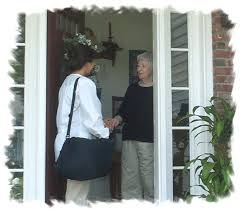What is Home Health?

Just as the name implies, Home Health is healthcare provided in the comfort of your own home. Most people, especially the elderly, don't want to leave their home. As the old saying goes, “There’s no place like Home.” This can be especially difficult when one spouse has to be admitted to a nursing facility while the other spouse remains at home.
My grandmother was one who never wanted to leave her home. She used to tell us, "This is the home that my husband built for us. I want to die here." She didn't get her wish. Her mental and physical condition deteriorated to the point that she could no longer live alone and had to be admitted to a nursing facility. If we’d known what we know now, we probably would have utilized home health services sooner and kept her at home longer.
Home care reached its height of utilization in the 1990's and it has maintained its popularity with healthcare providers and their patients. It is one of the most cost effective healthcare services because of the efficient use of personnel and not having the fixed cost of a building such as an assisted living facility, a nursing facility or hospital. Home health services can be provided anywhere the patient considers home. It can be an apartment, a hotel room, a group home or even a car, if that is what they are calling home at the time.
Below are the types of home care agencies that are available to you. Each type of agency is unique in the services it provides, its ownership or management structure, type of licensure, and method of payment received for its services. Each link below will also cover financial assistance that may be available to you for that particular service.
Click on each link below to read a thorough description of each type of agency and the services they provide.
Medicare Home Health
This is a Federally funded health care service that is provided to you in the comfort of your own home. This service is provided by a Medicare certified home health agency under the direction of your personal physician.
The primary services offered through are skilled care services. This means care provided to you by a licensed nurse (RN or LVN/LPN) or a rehabilitation specialist such as a licensed physical therapist, licensed occupational therapist or a licensed speech-language pathologist. It is what doctors recommend most often to rehabilitate you to your pre-medical issue health status or as close to it as possible.
A non-licensed certified home health aide (CNA) may also be ordered working under the direction of the registered nurse. These nurse aides are trained and certified to work with patients in the home environment.
You may also need durable medical equipment such as a home oxygen, a hospital bed with a support mattress to prevent pressure ulcers, a wheelchair, a rolling walker, bedside commode, or cane. These items have to be ordered by your physician and you must have a qualifying diagnosis in order to have them covered under Medicare.
Click Medicare Home Health to learn more.
Medicaid Home Health
Medicaid Home Health is a health program for people with low incomes and available resources. Of all the government reimbursed programs in the country, it is probably the most complicated to navigate. Why? Because each state sets its own standards, qualifications and programs. Even though it is jointly funded by the Federal Government and the States, each State has a different way of administering it. It even has a different name in several States; Medi-Cal in California, MassHealth in Massachusetts and TennCare in Tennessee.
I won’t try to report the different programs each state offers or what their qualifications are. It would be too difficult a task to try to accomplish. Instead, I will tell you about the programs and qualifications that Texas has because this is where I reside and these are the programs with which I am most familiar. Although Medicaid provides services for low income individuals including children and the disabled and others, I will report only those programs that provide services to the elderly.
I think you will get a good idea of the programs that may be available to you in your state. They may be called by a different name and the services may be different in some ways, but there will also be a lot of similarities. If you find a Texas Medicaid program that I’ve described that seems to fit your needs, you just need to contact the Medicaid worker that serves your area of your state and he/she will be able to answer all your questions.
Click Medicaid Home Health to learn more and to see if you qualify.
Non-Medical H.H.
Non-medical agencies provide elder care services to seniors who wish to stay in their homes instead of going to an assisted living facility or a nursing home. The typical agency provides unlicensed caregivers, Certified Nurse Aides or Sitters who come to your home at your convenience and help you with what is commonly called, activities of daily living.
These are activities that you were easily able to perform and probably took for granted some years ago but are now increasingly becoming more difficult to achieve. Some examples are: bathing, dressing, doing your laundry, cleaning the house, driving to the store, dialing the telephone or preparing a meal. These are only a few examples of what the caregiver can do for you to help you get through the day.
Click Non-Medical Home Health to learn more about the different services that are available through this type of health service.
To explore other elder care services available to you, leave the Home Health page and go back to the Home Page
Recent Articles
-
I STILL MATTER
Dec 23, 24 08:37 PM
I STILL MATTER As time passes on I turn the next page to discover a new me while I continue to age. I may no longer be who I was long ago but I still -
Relocating Your Elderly Parents
Jun 10, 23 05:29 PM
Relocating your elderly parents can be very difficult -
Side Jobs for Senior Caregivers
Jun 10, 23 05:03 PM
5 tips for starting a side job that will allow you to bring in income while caring for your loved one.
